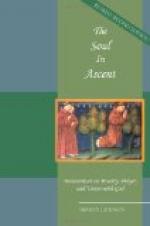The first step in the Ascent of the Soul is the development of ability to discriminate between right and wrong. The powers of the soul are enlarged and vivified with the bodily growth, but whether there is any necessary connection between the growth of the one and that of the other, we know not. This alone is sure—clearer vision, with ever-increasing distinctness, reveals the certainty that moral laws are universal and unchangeable. The process of adjustment to the moral order is partly voluntary and partly involuntary. It is hastened by the hidden forces of vitality, and it may be hindered by its own choices. As a human being who refuses to eat will starve, so a soul which turns away from truth will starve. The law in one case is as inexorable as in the other. This consciousness of the moral order is sometimes dim even in mature years because neglect always deadens appreciation. Paul said that the law is a schoolmaster leading to Christ. By that he intended to teach that we must realize that we are under moral law before we can know that its violation will result in a state of ruin needing salvation. First that which is natural, then that which is spiritual. The phrase “natural law in the spiritual world” means that the consequences following right and wrong are as inevitable and essential in the realm of spirit as in that of matter.
The progress of the soul is dependent on the realization that there is a moral quality in thoughts, emotions, choices; that the consequences following them grow out of them as flowers from seed, and that they determine not only the character but the happiness and welfare of the one exercising them.
The next step in the upward movement of the soul is the realization of its freedom. It is possible for one to know that he is under law, without at the same time appreciating that he is free to choose whether he will obey. I may see a storm sweeping toward me and know that behind it is resistless force, and know, also, that to step outside the track of that storm is impossible; and it is conceivable that a soul may know itself as able to think, feel, act, and, at the same time, be under the dominion of forces before which it is powerless. The practical question, therefore, for all in this human world is not, are there spiritual laws? but, may we choose for ourselves whether we will obey or disobey them? Until the soul knows itself to be free to choose, there will be no deep feeling of obligation, without which there can be no motive impelling toward the heights. Here also we walk in the dark. The genesis of the consciousness of freedom has never been observed. DuBois-Reymond has called it one of “the seven riddles of science.” We are no nearer the solution of the problem than were our fathers a thousand years ago. But one thing at least we do know: He who believes himself to be a puppet in the hands of unseen forces will never fight them. If freedom is a fiction the universe is not only unmoral, but




